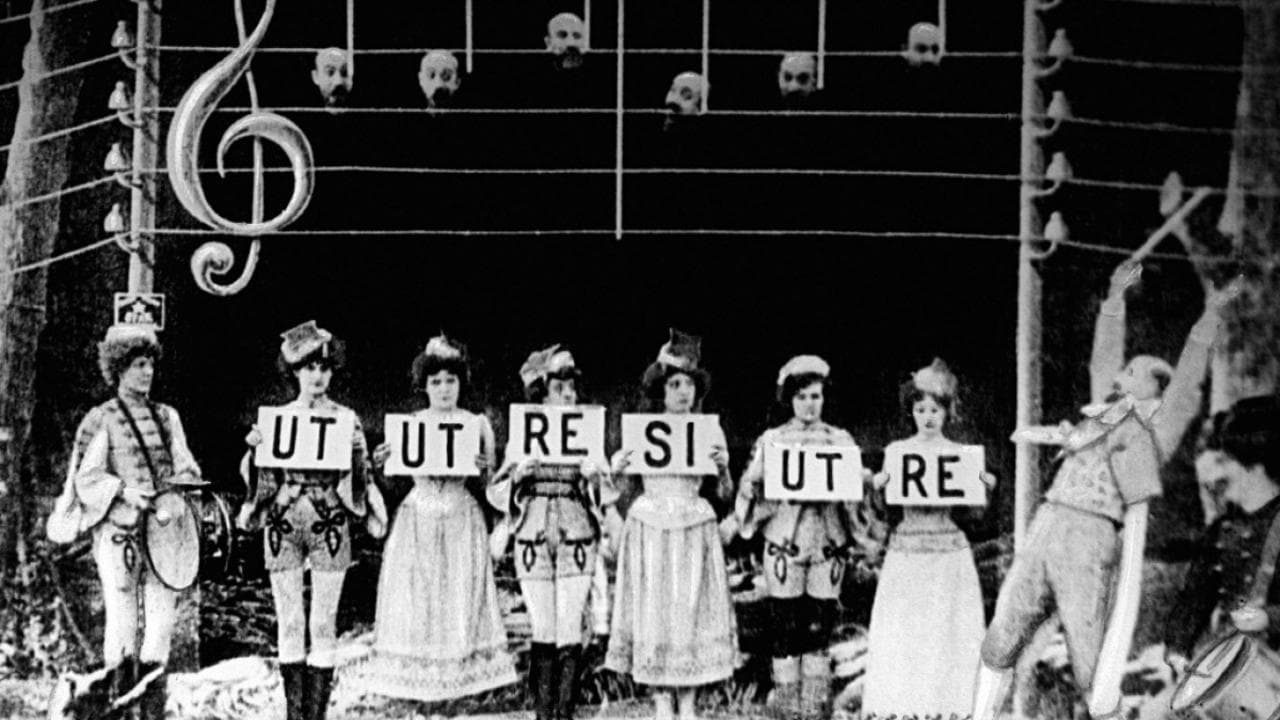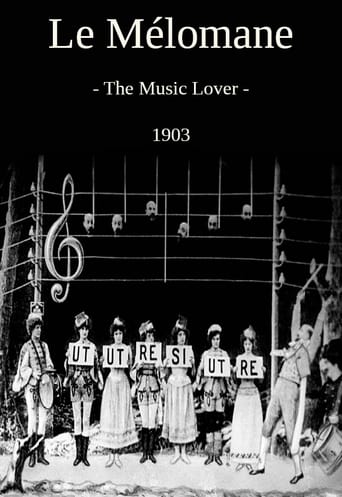

The greatest movie ever made..!
... View MoreIt’s fine. It's literally the definition of a fine movie. You’ve seen it before, you know every beat and outcome before the characters even do. Only question is how much escapism you’re looking for.
... View MoreOne of the most extraordinary films you will see this year. Take that as you want.
... View MoreYes, absolutely, there is fun to be had, as well as many, many things to go boom, all amid an atmospheric urban jungle.
... View MoreMore head play from Georges Melies, the man widely considered to be the master of cinema. This time, the early film director has a ball with a music-inspired sketch that employs greater variation and complexity to the likes of his head-swapping shorts from five years before. There's a larger cast, plenty of singing musical heads and decapitation and the auteur's use of surreal humour that makes it so unique. The alternate title is THE MUSIC LOVER and the story sees a music teacher becoming increasingly frustrated with his female students, to which end he decides to remove his head and utilise it in a unique musical display. Great stuff indeed.
... View MoreMelies had to be the most imaginative and creative of the early filmmakers as this surreal short shows. The master film magician appears in the role of music teacher who, chancing upon lines of telegraph wires in the country while out with his class, creates lines of music by detaching his head and throwing it up into the wires to form that little dot at the bottom of a music note. A new head instantly appears on his shoulders and Melies throws this one into the wires as well - a trick he repeats until a full line of music is created. We can only wonder where Melies got his ideas from - and why such a creative genius found it impossible to adapt to the increasing sophistication of film-making.
... View MoreThough filmmakers had been toying with synchronised sound for almost as long as motion pictures have existed William K.L. Dickson's 'Dickson Experimental Sound Film (1894)' is a remarkable piece of cinema history audiences didn't get their first non-silent feature film until 'The Jazz Singer' in 1927. Why, then, would the "Cinemagician" turn his attention so early towards a short film based around music? Viewed today, and often presented in complete silence, the two-minute film seems to be lacking a certain rhythm, regardless of its visual triumphs. But, of course, I am, once again, underestimating the resourcefulness of these early filmmakers, as Georges Méliès usually accompanied his films with a live musical performance and spoken narration. My viewing of 'Le Mélomane / The Melomaniac (1904)' {also known as 'The Music Lover'} was today supplemented by Carlos Gardel and Alfredo Le Pera's "Por una Cabeza," a 1935 tango basically chosen at random from my music collection.Much as he did six years earlier in 'Un homme de têtes / The Four Troublesome Heads (1898),' Méliès uses this brief gimmick film to show off his talent for visual effects, employing extensive substitution cuts, multiple exposures and cross-fades to create the illusion of real magic. The plot is simple enough: a music teacher (our usual host, Mr. Méliès himself) begins to show his marching-band students how to play music, but won't settle for writing down the notes on a small piece of paper. Instead, he fashions the music notes out of his own head (yes, you heard correctly!), removing his skull from its proper position and tossing it upwards at the telegraph wires above him, where it sticks in the appropriate place. Immediately, a new head appears on the teacher's shoulders, and the process is repeated several times. As the band marches off, presumably playing the aforementioned music, the multiple heads are still swivelling about in their places.The film's ending is one of the absolute finest I've seen from the director, and was obviously a product of his former experience as a magician. With the stage empty except for the extant heads, Méliès performs a majestic coup de grâce when they are suddenly transformed into live birds, which flutter gracefully across the set. Interestingly, the uniquely-constructed musical notes form the opening of "God Save the King," an interesting choice for the French filmmaker. 'The Melomaniac' is an interesting Méliès short in many ways. Though not quite as revolutionary as his earlier efforts, as most of the techniques seen here can be glimpsed in earlier films, it is nonetheless an admirable attempt to add some "music" to silent cinema. Give me a video camera, and I'd probably be unable to reproduce the visual effects, which are meticulously-constructed while maintaining a sense of fun about them.
... View MoreMelomaniac, The (1903) *** (out of 4) aka Le Melomane Entertaining film from the French master has him playing a band leader who is trying to teach six women the notes to sing and play. With nothing else to do, the leader (played by Melies) starts to remove him head and throw them up into the air where they catch on some lines and this way shows off the notes. There's nothing too overly special here that would make this one of the director's better films but it is highly entertaining with some great special effects to pull it together. The effect of Melies removing his head several times is very well done and their effect when up on the line is also done extremely well. The film has a few good laughs as well, which makes this one worth viewing.
... View More